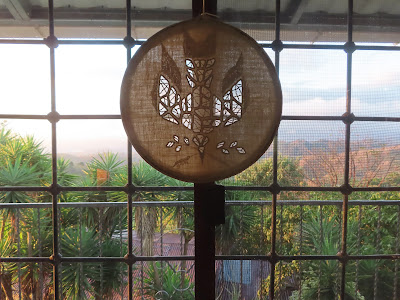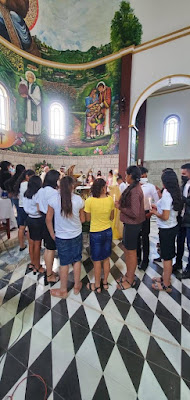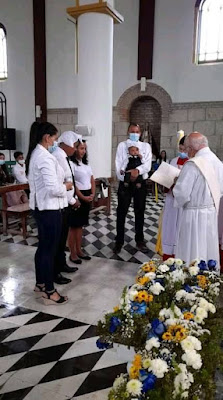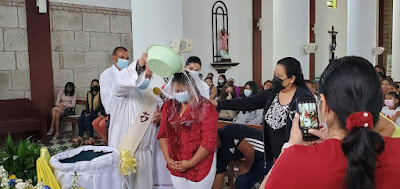Wednesday, January 26, I met with the catechists of confirmation to prepare for confirmations next month, from February 10 to 12. There were about thirty catechists from about 36 towns and villages in the parish who have been preparing about 425 for confirmation. We were preparing the Masses in five different places as well as confessions in six places. I’ll be accompanying them in the next two weeks.
Last Saturday, we had the first round of confessions in the main church in Dulce Nombre. There were about 56 confirmation candidates and some adult sponsors who came; even though there was only one priest, the confessions were finished in about three hours. Among those to be confirmed there were 28 who had not made their first communion. They received the Eucharist for the first time at the Mass at the end of confessions. The pastor also asked me to baptize a couple and their child. I had recently done the final pre-marriage interview with them and I felt privileged to baptize them last Saturday, while the pastor was finishing up confessions. The couple also received their first communion at the Mass. What a day for sacraments – baptisms, confessions, and first communions.Monday, January 31, 2022
The confirmation rush begins - and more news
Friday, January 21, 2022
Washing dishes: in memory of Jim Forest and Thich Nhat Hanh
 |
| In the Forest kitchen in Alkmaar, Netherlands. |
An animated discussion was going on in the main room just out of earshot, but I had been given the task that evening of doing the washing up. The pots, pans, and rice bowls seemed to reach half way to the ceiling in that closet-sized kitchen. I felt really annoyed. Stuck with an infinity of dirty dishes, I was missing the main event.
Somehow Nhat Hanh picked up on my irritation. Suddenly he was standing next to me. “Jim,” he asked, “why are you washing the dishes?” I knew I was suddenly facing one of those very tricky Zen questions. Saying it was my turn wasn't adequate. I tried to think of a good Zen answer, but all I could come up with was, “You should wash the dishes to get them clean.” “No,” said Nhat Hanh. “You should wash the dishes to wash the dishes.” I've been mulling over that answer ever since—more than four decades of mulling. I'm still in the dark. But what he said next was instantly helpful: “You should wash each dish as if it were the baby Jesus.”I often enjoyed washing dishes.
Jim Forest wrote a response to the blog note, recalling Dorothy Day.
A quote from Dorothy Day that rings the same bells: “Paper work, cleaning the house, cooking the meals, dealing with the innumerable visitors who come all through the day, answering the phone, keeping patience and acting intelligently, which is to find some meaning in all these encounters—these things too are the work of peace, and often seem like a very little way.”
Sunday, January 02, 2022
A spirituality of a missionary deacon 1: critique of two recent books
In the past year and a half I have read two books on the diaconate which I found very inadequate. Perhaps my criticisms arise from my unique experience – a deacon living and working in rural Honduras, in a large parish with only one priest. I won’t mention the works but I want to share what caused me concern.
 |
| Christmas Vigil Mass - procession to the crib |
I found these problems with the most recent book.
- The author ties the permanent diaconate too closely to the sacrament of matrimony and, in this way, he does not get to the core of the vocation of the deacon. At one point he writes, “The evangelizing witness of the deacon is rooted in sacramental marriage, through which he strives to sanctify his family.”
- The same book does not mention the importance of Catholic Social Teaching, especially for the deacon.
- Speaking of prayer, the author seems to place more emphasis on adoration than on the Mass.
- I did not see the author connecting the diakonia of charity with the Eucharist
- When dealing with racism, he seems to look almost exclusively at only promoting concord, not addressing the issues of racial justice.
- Ministry with the poor is considered more in terms of service to them or for them. Where is the reference to Pope Francis’ culture of encounter?
The other book proposes a diaconal spirituality which I find limited.
- It seems to be a privatized, individualistic spirituality. Where is the ecclesial dimension of the spirituality of a deacon?
- The spirituality that seems to be “churchy.” Where is the dimension of the diakonia of Charity?
- Where are the poor in the spirituality of the deacon?
- Whereas the other book referred to the deacon in the workplace, this book does not pay enough attention to the deacon’s workplace.
- I found the spirituality was not very incarnational, pespeically in terms of recognizing the presence of God in the daily life. Though he refers to De Caussaude’s “sacrament of the present moment,” I felt as if he treated it rather fatalistically. He also did not refer to Pope Francis’ “sacrament of the poor,” which I believe should be central to a diaconal spirituality
- There seems to be a dualism in his spirituality. He wrote, “The deacon’s service is first and foremost to God rather than to the people; only in God and with His grace can he truly serve the people.” I believe that this sets up a false dichotomy between God and God’s creation.
- When dealing with service to the poor he relies on the virtue of “empathy.” But what about compassionate accompaniment of the poor?
- I also found an overreliance on Collins’ emphasis on the deacon as herald.
I found both books seem to promote an individualistic spirituality and that Pope Francis’s call to ministry in the margins is minimally addressed.
Perhaps I am overly critical but both these books, as well as other writings on the diaconate, seem to miss much of what could serve us deacons in our diakonia.
Rather than write an extended critique, I think it is important to begin to elaborate my spirituality of the diaconate, which I will do in a subsequent post.
READING in 2021
Gregory Boyle, The Whole Language: The Power of Extravagant Tenderness. New York: Avid Reader Press/Simon & Schuster, 2021. In turn, inspiring, joyful, and poignant. Read and laugh, weep, and pray.
Bill Wylie-Kellerman, Celebrant’s Flame: Daniel Berrigan in Memory and Reflection. Cascade Books, 2021.Great stories of the prophetic poet priest.
Dorothy Day, On Pilgrimage: The Sixties. Maryknoll, NY: Orbis Books, 2021.The find of 2021 was the work of Tomas Halik. This Czeck priest, ordained underground during the Soviet occupation of Czechoslovakia, is a psychotherapist, theologian, and philosopher. His works refer to many disparate sources, including scripture, Augustine, Therese of Lisieux, Nietzsche, Freud, Jung, Cervantes, Teilhard de Chardin to approach issues of doubt, faith, atheism, love, the mystery of faith, and more. His chapter in Patience with God on St. Therese de Lisieux is helpful for anyone struggling with faith and doubt, as the Little Flower did.
Tomáš Halík, Patience with God: The Story of Zaccheus Continuing in Us. New York: Crown Publishing (Random House), 2009.Tomáš Halík, Night of the Confessor: Christian Faith in an Age of Uncertainty. New York: Image Books (Doubleday), 2012.Tomas Halik, I Want You to Be: on the God of Love. Notre Dame, IN: University of Notre Dame Press, 2016.
Jon M. Sweeney, Feed the Wolf: Befriending Our Fears in the Way of Saint Francis. Minneapolis MN: Broadleaf Books, 2021.
Abraham Joshua Heschel, Thunder in the Soul: To Be Known by God. (Plough Spiritual Guides: Backpack Classics). Walden, New York: Plough Publishing House, 2021.
Jon W. Sweeney, Nicholas Black Elk Medicine Man, Catechist, Saint. Collegeville, MN: Liturgical Press, 2021.
Jim Forest, Eyes of Compassion: Learning from Nhat Hanh. Maryknoll, NY: Orbis Books, 2021.
Caryll Houselander, The Risen Christ: The Forty Days After the Resurrection. New York: Scepter Publishers, 2007 (1958).I've read several novels, most of them mysteries which I devoured for sheer diversion. But the more “serious” novels I read included Daniel Hornsby’s Via Negativa: A Novel (New York, NY: Alfred A Knopf, 2020) and Anne Tyler’s Redhead by the Side of the Road (NY: Knopf Doubleday Publishing Group, 2020).










